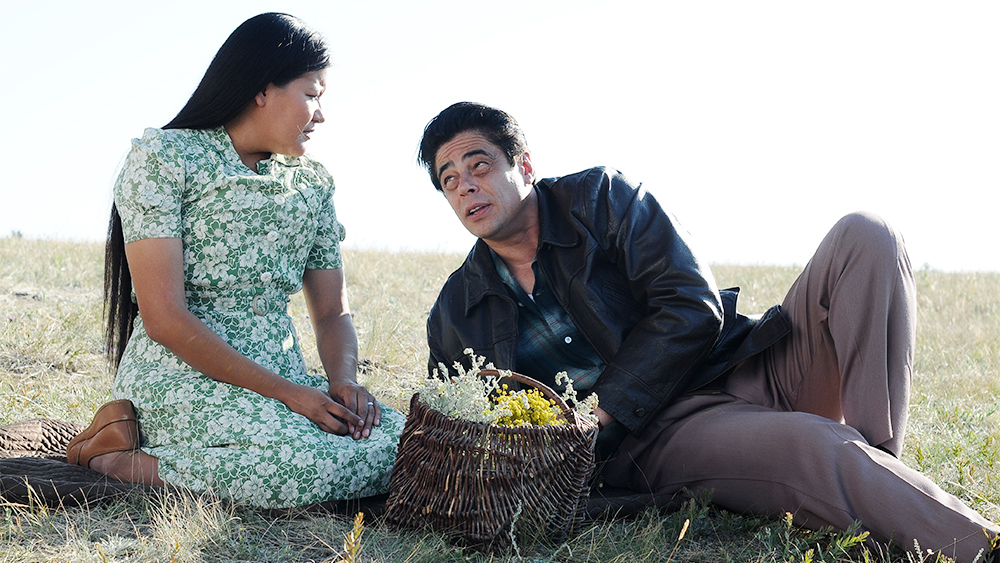By Chlotrudis Independent Film Society
Rating: 4 cats
Director: Arnaud Desplechin
Starring: Benicio Del Toro | Gina McKee | Mathieu Amalric | Michelle Thrush | Misty Upham

Country: france, united_states
Year: 2014
Running time: 117
IMDB: http://www.imdb.com/title/tt2210834/combined
Jason says: “Early on in JIMMY P., a character apologizes for the way he tells, and it’s a bit of an odd moment, as he’s not the one whose manner of speech is likely to give a modern audience pause. Confronting that is what makes this movie a little more interesting than it might be – as much as we today attempt to respect different cultures, we often get uncomfortable with actually treating them as different. That is likely not quite the intent of the original work, but it’s hard to watch the movie without thinking about it.
“We are introduced to James Picard (Benicio Del Toro) as he works his sister’s farm in Browning, Montana, in 1948. He is suffering debilitating pain and occasional spells of blindness, and has been since returning from the way. He is referred to Winter Hospital in Topeka, Kansas, where the doctors can find nothing physically wrong with him but are very hesitant to label him as schizophrenic based on his responses to the standard psychiatric tests. So one calls in an old friend, Dr. Georges Deveraux (Mathieu Amalric), an anthropologist whose work focuses on American Indians, although he is looking to learn as much as help.
“The decision to call Deveraux is made after one of the doctors in residence says rather bluntly that they cannot tell whether Jimmy is mentally ill or just an Indian and this beyond their comprehension, and it’s a comment that shapes how the movie engaged with Jimmy’s culture in a challengingly honest way: At first, it seems awful, like Native Americans are not quite human, but it eventually proves to be both honest and useful. This tension between how most in the audience likely want to be respectful to Native peoples and how that respect often takes the form of depicting them as assimilated rather than ‘primitive’ is a constant throughout the movie, whether expressed through Deveraux’s note-taking, the drums on the soundtrack, or Jimmy’s halting speech. It’s a facet that one must sort of stand outside the movie to appreciate and which could easily rub a viewer the wrong way, but which turns out to be an interesting and crucial layer.
“The actual in-movie story is fairly interesting as well, with Deveraux coaxing a tale out of Jimmy that will be familiar to viewers of almost every culture – with the resistance to and distrust of psychotherapy being just as universal as the failed marriages and absentee fatherhood – with enough specific to that of the Blackfoot nation to keep it interesting. It’s a bit weaker in the other half, where Deveraux is described as having secrets and his own complicated web of relationships, but much more is left for the viewer to infer. It is probably more true-to-life that the two protagonists’ stories do not neatly dovetail, but it does make each feel a little more lightweight than the filmmakers perhaps intended. On the plus side, director Arnaud Desplechin and his co-writers do not manipulate things so that one crucial buried fact triggers a breakthrough, a refreshingly realistic change of pace.
“Both halves of the story are anchored by good performances, although there is something a little off about each. Benicio Del Toro, for instance, is probably a bit too old for Jimmy; a little basic math has the character about 31 years old, and Del Toro seems a little more weathered and worn down than a life of working outdoors and a war wound can account for. It’s an effective portrayal of pride, pain, and cultural divide powerful enough that Jimmy has to force his words out, and the slow delivery never pegs him as stupid. He plays nicely off Michelle Thrush and Misty Upham as, respectably, his older sister and first love.
“Mathieu Amalric, meanwhile, occasionally seems to be under instruction to play up the absent-minded-professor aspects of Deveraux to a somewhat excessive degree, especially in his early scenes with Del Toro. That settles down soon enough, at least, so that eventually their scene together are enjoyably jagged depictions of men who value each other even if their personalities don’t quite mesh. It’s different kinds of fondness and friction than are on display in his boss with Gina McKee, who makes Deveraux’s friend/mistress/conscience Madeleine feel a lot more fleshed-out and integral than she otherwise might be.
“Things do get a bit shaky at times; even with the dual threads of Jimmy’s life story and Deveraux trying to extract it, JIMMY P. might have just been average without the added layer of pondering just how we look at other cultures. Even if that doesn’t factor in for a viewer, though, there are still enough capable performances and interesting ideas to make it worth the time. 4 cats
“Seen 7 March 2014 in the Brattle Theatre #1 (first-run, DCP).”
